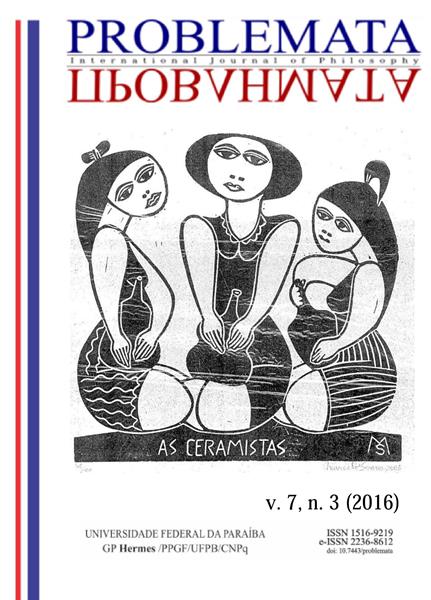Notas sobre a crítica de Marx à alienação no “capital” à luz da ética argumentativa
DOI:
https://doi.org/10.7443/problemata.v7i3.32090Abstract
no presente texto pretendemos abordar a crítica à alienação produzida por Marx no primeiro volume do Capital e tentaremos insinuar brevemente algumas pontes com as três normas fundamentais da ética, argumentativamente deduzidas. Devido ao fato da pesquisa documental ter sido realizada principalmente na Espanha, decidimos associar incidentalmente um breve diálogo com as obras dos filósofos espanhóis que abordaram de uma ou outra forma o tema.
Downloads
References
ARTETA, Aurelio. Marx: valor, forma social y alienación. Madrid: Ed. Libertarias, 1993.
LOPEZ VELASCO, Sirio. Fundamentos lógico-linguísticos da ética argumentativa. São Leopoldo: Ed. Nova Harmonia, 2003a.
______ Sirio. Ética para o século XXI: rumo ao ecomunitarismo. São Lepoldo: Ed. Unisinos, 2003b.
______. Ideias para o socialismo do século XXI com visão marxiana-ecomunitarista. Rio Grande: Ed. FURG, 2012.
MARTÍNEZ MARZOA, Felipe. La filosofía de El Capital. Madrid: Ed. Taurus, 1983.
MARX, K. (1864-1894). Das Kapital [3 vols.], Ullstein, Frankfurt-Berlin, 1969. El Capital (3 vols.). La Habana: Ed. Pueblo y Educación, 1973, 1983.
PRIOR OLMOS, Ángel. El problema de la libertad en el pensamiento de Marx. España: Ed. Biblioteca Nueva/Universidad de Murcia, 2004.
STRONG, M. Ecología Política. Madrid-Barcelona: Ed. Fuhem/Icaria, 1992.
Downloads
Published
Issue
Section
License
Authors who publish with this journal agree to the following terms:
- Authors retain copyright and grant the journal right of first publication with the work simultaneously licensed under a Creative Commons Attribution License that allows others to share the work with an acknowledgement of the work's authorship and initial publication in this journal.
- Authors are able to enter into separate, additional contractual arrangements for the non-exclusive distribution of the journal's published version of the work (e.g., post it to an institutional repository or publish it in a book), with an acknowledgement of its initial publication in this journal.
-
- Authors are permitted and encouraged to post their work online (e.g., in institutional repositories or on their website) prior to and during the submission process, as it can lead to productive exchanges, as well as earlier and greater citation of published work (See The Effect of Open Access).





